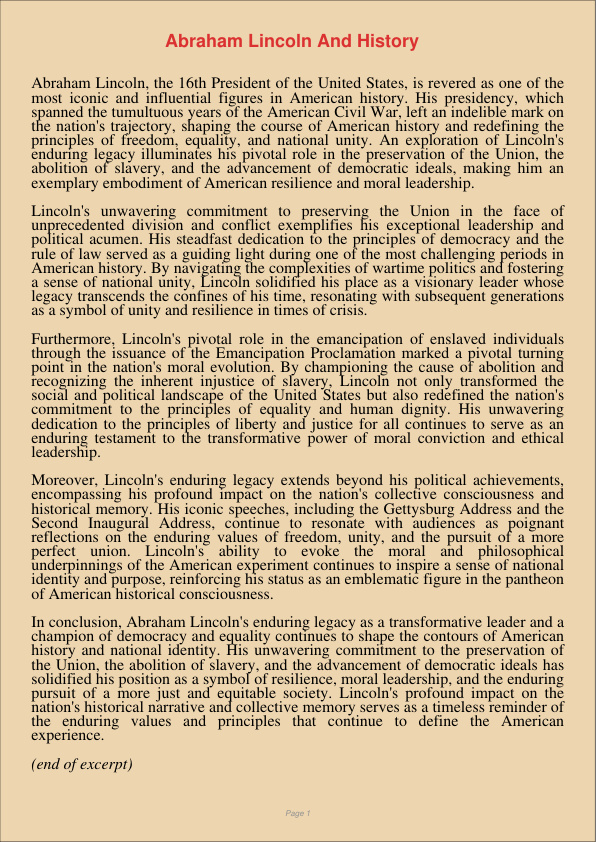Abraham Lincoln And History
Dec 31, 2023
abraham lincoln
history
Social science
Literature

Abraham Lincoln, the 16th President of the United States, is revered as one of the most iconic and influential figures in American history. His presidency, which spanned the tumultuous years of the American Civil War, left an indelible mark on the nation’s trajectory, shaping the course of American history and redefining the principles of freedom, equality, and national unity. An exploration of Lincoln’s enduring legacy illuminates his pivotal role in the preservation of the Union, the abolition of slavery, and the advancement of democratic ideals, making him an exemplary embodiment of American resilience and moral leadership.
Lincoln’s unwavering commitment to preserving the Union in the face of unprecedented division and conflict exemplifies his exceptional leadership and political acumen. His steadfast dedication to the principles of democracy and the rule of law served as a guiding light during one of the most challenging periods in American history. By navigating the complexities of wartime politics and fostering a sense of national unity, Lincoln solidified his place as a visionary leader whose legacy transcends the confines of his time, resonating with subsequent generations as a symbol of unity and resilience in times of crisis.
Furthermore, Lincoln’s pivotal role in the emancipation of enslaved individuals through the issuance of the Emancipation Proclamation marked a pivotal turning point in the nation’s moral evolution. By championing the cause of abolition and recognizing the inherent injustice of slavery, Lincoln not only transformed the social and political landscape of the United States but also redefined the nation’s commitment to the principles of equality and human dignity. His unwavering dedication to the principles of liberty and justice for all continues to serve as an enduring testament to the transformative power of moral conviction and ethical leadership.
Moreover, Lincoln’s enduring legacy extends beyond his political achievements, encompassing his profound impact on the nation’s collective consciousness and historical memory. His iconic speeches, including the Gettysburg Address and the Second Inaugural Address, continue to resonate with audiences as poignant reflections on the enduring values of freedom, unity, and the pursuit of a more perfect union. Lincoln’s ability to evoke the moral and philosophical underpinnings of the American experiment continues to inspire a sense of national identity and purpose, reinforcing his status as an emblematic figure in the pantheon of American historical consciousness.
In conclusion, Abraham Lincoln’s enduring legacy as a transformative leader and a champion of democracy and equality continues to shape the contours of American history and national identity. His unwavering commitment to the preservation of the Union, the abolition of slavery, and the advancement of democratic ideals has solidified his position as a symbol of resilience, moral leadership, and the enduring pursuit of a more just and equitable society. Lincoln’s profound impact on the nation’s historical narrative and collective memory serves as a timeless reminder of the enduring values and principles that continue to define the American experience.